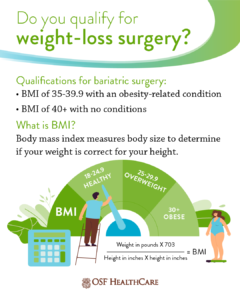Nobody needs to say anything. All you have to do is look in the mirror. Or try to put on clothes that fit fine six months ago.
You know you’re not just overweight. In fact, you’re obese. You’ve tried various diet and exercise programs, but nothing seems to work. Your extra weight has become a real problem, and it’s getting worse. It affects your health, both physical and mental. Your future is at stake.
Bariatric surgery might be an option.
“You don’t need a referral. It’s elective surgery, so you can schedule an appointment to meet with a surgeon and discuss the various options,” said Mary Alberts, RN, bariatric coordinator for OSF HealthCare Little Company of Mary Medical Center in Evergreen Park, Illinois.
However, there are criteria you have to meet.
How to calculate your BMI
Those criteria start with your body mass index (BMI). BMI is a measurement of body size and combines a person’s weight with their height to give an idea about whether a person has the correct weight for their height. Use this calculator to learn your BMI.
A BMI of 30 and over is considered obese; 40 and over is severely obese.
“In a nutshell, to qualify for bariatric surgery, you must have a BMI of 35 to 40 with an obesity-related disease, or comorbidity, like high blood pressure, diabetes, high cholesterol, osteoarthritis or sleep apnea,” Mary said. “Or, if your BMI is over 40, you would qualify with no comorbidities.”
More requirements for surgery
A qualifying BMI alone merely makes you a potential candidate for bariatric surgery.
Your provider will review your health history and conduct a current health assessment to help determine if surgery is your best option. Your previous attempts at weight loss are part of the assessment.
“Weight loss surgery should definitely not be your first choice for weight management,” Mary said. “You should have some documentation of your previous attempts at weight loss. Insurance companies do require that before agreeing to cover bariatric surgery.”
Other requirements of the insurance company include a mental health evaluation and meetings with a dietitian.
Are you a candidate?
“It’s important to be well prepared for surgery to have the maximum benefits from the surgery for the long term,” Mary said. “Surgery is a life changing event, and many factors can influence someone’s adjustment to and success with surgery. The psychologist or psychiatrist helps identify, evaluate and counsel each patient about those factors.
“A consultation with the dietitian enables a patient to learn healthy eating strategies required to promote long-term weight loss success.”
Commit to lifestyle change
If you are serious about losing weight, you owe it to yourself to commit to the same guidelines.
“When you have bariatric surgery, it’s a lifestyle change,” Mary said. “The surgery is just a tool to help you lose weight. You still have to work at it; make changes in your diet and exercise.
“It’s like when you get into your car. You can put your foot on the pedal and steer, but you still have to put the key in the ignition and turn it on before you can go anywhere. Surgery is like the key in the ignition. You have to commit to the lifestyle change.”
Other issues to address
Even if you meet the BMI and comorbidity requirements, you might not qualify for bariatric surgery.
You can’t be pregnant – or plan to become pregnant for at least a year. Substance-abuse problems, eating disorders or psychological disorders need to be identified as they may pose challenges achieving the best surgical outcome. Same with pulmonary or cardiovascular issues. Also, if your BMI is over 60, you might be required to lose some weight before surgery.
“We need to make sure your health is optimized,” Mary said.
The typical time frame from the first consultation to surgery would be about seven months, Mary said. That wait could be longer or shorter, depending on evaluations and how long it takes to adequately address your other issues.
While a referral for undergoing bariatric surgery may not be required, if you meet the BMI requirement and believe you could benefit from surgery, talk to your OSF HealthCare primary care provider.
Last Updated: April 22, 2022

